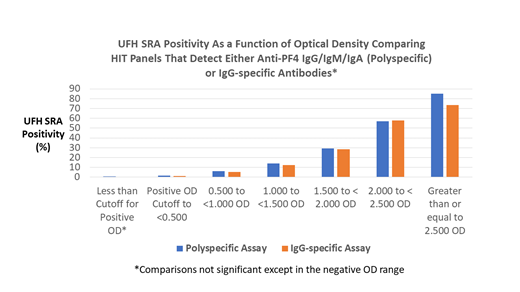Abstract
Introduction: Antibodies that cause heparin-induced thrombocytopenia (HIT) can be detected with either antigenic or functional assays. Previously, it has been shown that antigenic (ELISA based) assays that detect anti-platelet factor 4 (anti-PF4) IgG, IgM, or IgA (polyspecific) antibodies are more sensitive but less specific than functional assays such as the unfractionated serotonin release assay (UFH SRA), and that the use of anti-PF4 assays that detect IgG antibodies only, would increase the specificity but decrease the sensitivity of these assays for the detection of HIT antibodies that are prothrombotic (associated with positive functional assay). To date large epidemiologic studies have not confirm these findings. To evaluate the relative performance of anti-PF4 polyspecific and IgG-specific antibodies in their ability to detect prothrombotic HIT antibodies, we evaluated results of non-reflexive HIT panels that contained either anti-PF4 polyspecific or IgG-specific assays and unfractionated heparin serotonin release assays over an eight-year period at a U.S. reference laboratory.
Methods: Test results for 2 HIT detection panels were compared: 1 panel had UFH SRA plus the polyspecific PF4 ENHANCED® assay (GTI Diagnostics, Waukesha, WI) and 1 panel had UFH SRA plus the IgG-specific Zymutest HIA IgG assay (Hyphen Biomed, France). Test results were from the last 4 years of use for each panel (2009 to 2012 for the polyspecific panel; 2017 to 2020 for the IgG-specific panel). UFH SRA was performed as described by Sheridan et al, (1986) with positivity defined as ≥20% serotonin release by low dose UFH and >50% suppression of release at high dose (100 U/mL) UFH. For each year and assay, test results were stratified by optical density (OD) results, and the percent of results positive by UFH SRA was determined for each OD range. Median yearly UFH SRA positivity rates for each OD interval were compared for anti-PF4 polyspecific vs IgG-specific antibody assays using non-parametric statistical testing, Mann-Whitney U test, two-tailed, with significance defined as <0.05.
Results: HIT panels with either ELISA based assays detecting either anti-PF4 polyspecific or IgG specific antibodies demonstrated increasing UFH SRA positivity rates as OD increased. Approximately 50% UFH SRA positivity occurred when OD was in the 2.000 to range. No significant differences in SRA positivity were seen at any positive OD interval when comparing anti-PF4 polyspecific vs IgG-specific assays. A small but significant difference was seen when OD results were considered This observation may have been due to a in the review process (2017-2020): when a UFH SRA result was positive with a negative OD result, repeat UFH SRA testing was performed.
Conclusions: Our study demonstrates that the correlations of UFH SRA positivity and OD measurements are similar for anti-PF4 IgG-specific and polyspecific antibody assays. These results suggest the assay types may perform similarly for the detection of HIT and importantly provide important predictive information as to when an optical density value will lead to a positive UFH SRA result.
Wong: Quest Diagnostics: Current Employment, Current equity holder in publicly-traded company, Current holder of individual stocks in a privately-held company, Current holder of stock options in a privately-held company. Worfolk: Quest Diagnostics: Current Employment. Bi: Quest Diagnostics: Current Employment. Noh: Quest Diagnostics: Current Employment. Espinoza: Quest Diagnostics: Current Employment. Wu: Quest Diagnostics: Current Employment. Sahud: Quest Diagnostics: Current Employment. Racke: Quest Diagnostics: Current Employment. Dlott: Quest Diagnostics: Current Employment.


This feature is available to Subscribers Only
Sign In or Create an Account Close Modal